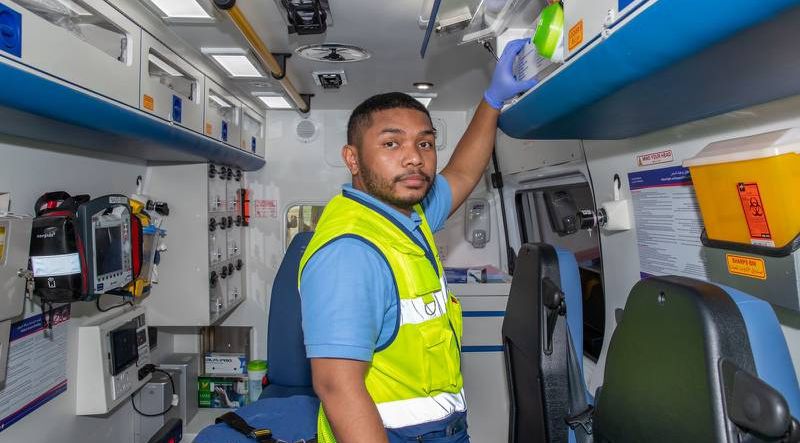Ambulance officials have urged the public not to use vital resources with inappropriate emergency calls. Recently, a Sharjah resident called for ambulance services saying that his cat was about to give birth. The National Ambulance later sent two ambulances and four emergency medics, only to find out that it was the caller's cat that had gone into labour.
According to ambulance officials, the incident has demonstrated the strain faced by emergency services due to such non-emergency calls.
Before COVID-19, the service took around 250-300 daily calls. However, the number has increased to an average of 600 and is expected to increase further during peak times. The holy month of Ramadan is also a busy period for the services.
"The demand for health services has greatly increased as a result of the pandemic, and that is no different for National Ambulance,” said the emergency service's chief executive, Ahmed Al Hajeri.
As per data, there is a major increase in the number of non-emergency incidents or COVID-19 related queries.
“Our highly trained staff in the ambulance communications centre advise callers on how to deal with it [a medical situation] themselves or provide details on how to contact the right authorised sources," Al Hajeri added.
However, other times they receive unnecessary calls saying that they did not have a car or did not want to take a taxi to the hospital. Furthermore, callers dialled to report stray animals or unpaid salaries. There was one caller who had dialled 998 asking where to buy paracetamol tablets.
In 2019, the National Ambulance call operators were handling 6,763 monthly calls on average. However, in 2021, the numbers have increased to 18,537 a month. And out of these, only 10-15 percent were related to critical patients in need of immediate care.
This surge in call volume has resulted in the rise of ambulance occupancy rates and stretched call handling capacity to unprecedented levels.
In this regard, Al Hajeri called on the public to think before calling for an ambulance, adding that it can put at risk the lives of those who may need more urgent care.
“National Ambulance is here to serve people who are at their most vulnerable. We are always prepared to treat life-threatening emergencies. Calling for an ambulance inappropriately may cause avoidable delays and have an impact on people who need timely, urgent life-saving treatment," he added.
In this message to the public, Al Hajeri urged community members to take a responsible role towards society by contributing to saving more lives and not jeopardising the critical front-line emergency medical service.
“I would urge them (public) to think twice about calling for an ambulance if it is a non-emergency situation. They can call their general practitioner or visit the nearest medical facility. But if in doubt, and unsure if the situation qualifies as an emergency, they should not hesitate to call us as our staff are trained to help and will direct them to the appropriate resources," the official added.
Service addresses cases that require immediate response
The official underlined the illnesses that require the most urgent medical care include strokes and heart problems. Delays in providing appropriate care for such conditions can result in long-term damage or death.
Some of the signs of a heart attack include severe chest pain and difficulty in breathing. A stroke can be recognised in case of a loss of vision, sudden numbness, weakness, slurred speech and confusion.
Other medical conditions requiring urgent attention include severe injuries or trauma linked with uncontrolled bleeding, burns and unconsciousness.
National Ambulance continues to work closely with hospitals to reduce total call times to ensure effective management of resources using data analytics.
Emergency call taker Reem noted that non-emergency or hoax calls add additional strain on the services during busy hours.
“It ties us up and potentially puts lives at risk. Many cases request an ambulance as a means of transportation to the hospital due to the lack of a car or unwillingness to request a taxi," she said.
SOURCE: The National News
 AR
AR UR
UR
